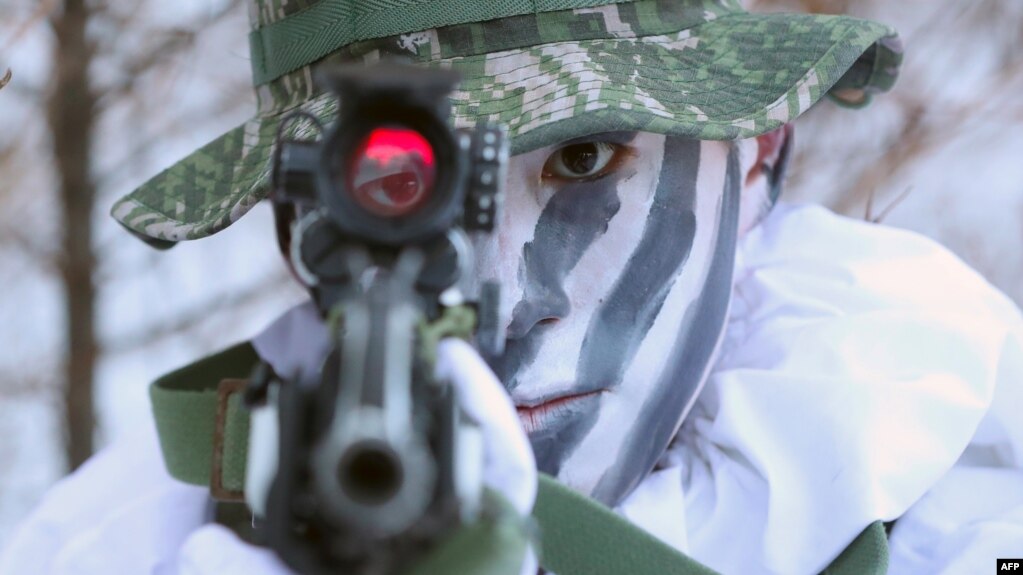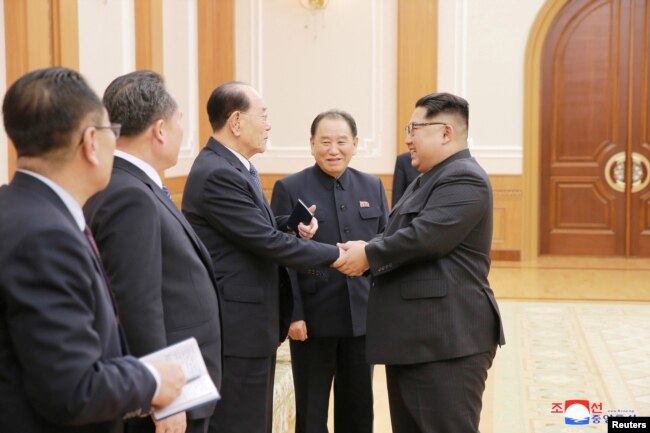US, S. Korea Military Exercises Could End Outreach to Nuclear North
The resumption of U.S.-South Korea joint military exercises, which were postponed until after the PyeongChang Olympics and Paralympics end in late March, could also mark the end of the current diplomatic outreach to North Korea.
The annual joint exercises include the Key Resolve strategic simulation drill, where U.S. and South Korean troops and military assets are deployed to respond to potential North Korean threats, and field exercises called Foal Eagle. Past drills involved nearly 20,000 American troops, 300,000 South Korean forces, and an array of bomber aircrafts, fighter jets and warships.
Needed deterrence
Military leaders deem these conventional exercises to be essential to maintain defense readiness and deterrence against the growing North Korean nuclear threat. It is also standard practice for every country in the world to conduct ongoing training for soldiers that are continually being drafted or deployed.
“All militaries train. The Korean People’s Army in North Korea trains. The PLA (People’s Liberation Army) trains in China. That’s what militaries do,” said North Korea security analyst Daniel Pinkston, a lecturer in international relations with Troy University in Seoul
North Korea has called these joint exercises threatening rehearsals for invasion.
South Korean President Moon Jae-in negotiated a delay in this year’s exercises to ensure the safety of the winter Olympics games being held close to the inter-Korean border. North Korea’s participation in the Olympics has also been accompanied by a pause in its missile launches and nuclear tests.
In the year prior, Pyongyang conducted numerous provocative tests, after publicly setting the goal to develop a functional nuclear intercontinental ballistic missile that can target the U.S. mainland.
In response, the administration of U.S. President Donald Trump has led an international effort to impose harsh sanctions on the North that cut off much of its income, including banning its lucrative coal and mineral exports.
Freeze for freeze
Moon’s diplomatic outreach has enacted what is basically a temporary “freeze for freeze” proposal, suspending both the U.S.-South Korea joint drills and North Korean provocations that China and Russia have been advocating to reduce regional tensions.
Washington has so far rejected any proposals to further suspend conventional military exercises that it argues are defense oriented and legal under international law, while it says North Korea’s nuclear program threatens its neighbors and the world.
There is, however, speculation that Washington and Seoul may try to reduce the size and scope of the exercises to make them less threatening to the North, perhaps by eliminating decapitation simulations that practice targeting leadership in Pyongyang, or excluding U.S. nuclear capable bombers from participating in the drills.
“The question is what level of the exercises is adequate for military preparedness and for robust deterrence purposes, and how do you calibrate it in a way that is nonthreatening,” said Pinkston.
But Pyongyang has warned it would respond to the resumption of the joint drills, possibly by resuming provocative nuclear and missile tests, even if it means triggering further sanctions.
“The North Korean authority must do its own calculation about gains and losses about such an action in protest to the resumption of the military exercises. So it is all up to Kim Jong on government,” said Bong Young-shik, a political analyst with the Yonsei University's Institute for North Korean Studies in Seoul.
Olympic engagement
North Korea's official KCNA news agency on Monday said restarting the drills would be a “provocative act” that would undermine Pyongyang’s recent efforts to “defuse tension and create a peaceful environment.”
Moon’s Olympic engagement efforts with the North, including marching together at the opening ceremony and fielding a unified women’s hockey team, has reduced inter-Korean tensions and brought about an invitation from the North Korean leader to host the South Korean president in Pyongyang for a leaders summit.
By participating in the Olympics, Pyongyang also embarked on what critics called a “charm offensive,” meant to improve its threatening image and weaken support for economic sanctions imposed for its continued nuclear violations.
Moon’s diplomatic outreach, however, has so far been unable to bring Washington and Pyongyang into direct talks to resolve the nuclear standoff. The U.S. will not engage in official negotiations until the North agrees to give up its nuclear program, which Pyongyang refuses to do, insisting that its nuclear weapons are needed to prevent a U.S. invasion.
“History does not give me much confidence that this will lead anywhere, especially when the bargaining position of the U.S. side is that the North does have to give up its weapon nuclear weapons and parts of its missile program,” said regional security analyst Grant Newsham with the Japan Forum for Strategic Studies in Tokyo.
The Trump administration recently indicated a willingness to support Moon’s efforts and engage in exploratory talks. U.S. officials on Tuesday said Vice President Mike Pence, who led the U.S. Olympic delegation at the Olympics opening ceremony, was planning to meet with Kim Yo Jong, the sister of the North Korean leader at the games, but North Korea canceled the meeting at the last minute.
However the vice president also clarified that the U.S. “maximum pressure” approach, which includes increasing economic sanctions and maintaining the credible threat of military force as well, would remain in place until the Kim government agrees to give up its nuclear weapons. voanews



Comments
Post a Comment